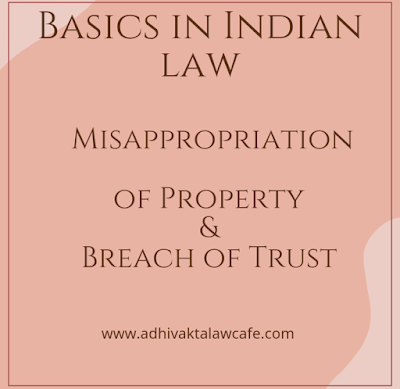DISHONEST MISAPPROPRIATION OF PROPERTY
IPC does not define misappropriation, but it can be understood in common parlance as an unlawful appropriation of funds or thing or conversion to one’s own use any movable property.
Illustrations
-
A takes property belonging to Z out of Z’s possession, in good faith believing at the time when he takes it, that the property belongs to himself. A is not guilty of theft; but if A, after discovering his mistake, dishonestly appropriates the property to his own use, he is guilty of dishonest misappropriation of property.
-
A, being on friendly terms with Z, goes into Z’s library in Z’s absence, and takes away a book without Z’s express consent. Here, if A was under the impression that he had Z’s implied consent to take the book for the purpose of reading it, A has not committed theft. But, if A afterwards sells the book for his own benefit, he is guilty of dishonest misappropriation of property.
-
A and B, being, joint owners of a horse, A takes the horse out of B’s possession, intending to use it. Here, as A has a right to use the horse, he does not dishonestly misappropriate it. But, if A sells the horse and appropriates the whole proceeds to his own use, he is guilty of dishonest misappropriation of property.
Illustration
-
A finds a government promissory note belonging to Z, bearing a blank endorsement. A knowing that the note belongs to Z, pledges it with a banker as a security for a loan, intending at a future time to restore it to Z. A is guilty of dishonest misappropriation of property.
-
A finds a rupee on the road, not knowing to whom the rupee belongs. A picks up the rupee. Here, A has not committed the above offence.
-
A finds a letter on the road, containing a bank note. From the address and contents of the letter, he learns to whom the note belongs. He appropriates the note. He is guilty of dishonest misappropriation of property.
-
A sees Z drop his purse with money in it. A picks up the purse with the intention of restoring it to Z, but afterwards appropriates it to his own use. A is guilty of dishonest misappropriation of property.
CRIMINALBREACH OFTRUST
Whoever, being in any manner entrusted with property, or with any dominion over property, dishonestly misappropriates or converts to his own use that property, or dishonestly uses or disposes of that property in violation of any direction of law prescribing the mode in which such trust is to be discharged, or of any legal contract, express or implied, which he has made touching the discharge of such trust, or wilfully suffers any other person so to do, commits “criminal breach of trust”.
From the definition, the ingredients of the offence are –
-
Person is entrusted with property
-
He does any of the following acts with the said property
-
Dishonestly misappropriates or
-
Converts to his own use or
-
Dishonestly uses or disposes of that property in violation of any direction of law or legal contract or
-
Wilfully suffers any other person so to do
-
In simple words, where any sum of money issaid to have been embezzled andit is proved that he had received the sum but he failsto account for the same, the offence of criminal breach of trust is established. That is, once the entrustment is proved, it is for the accused to prove how the property entrusted was dealt with.
